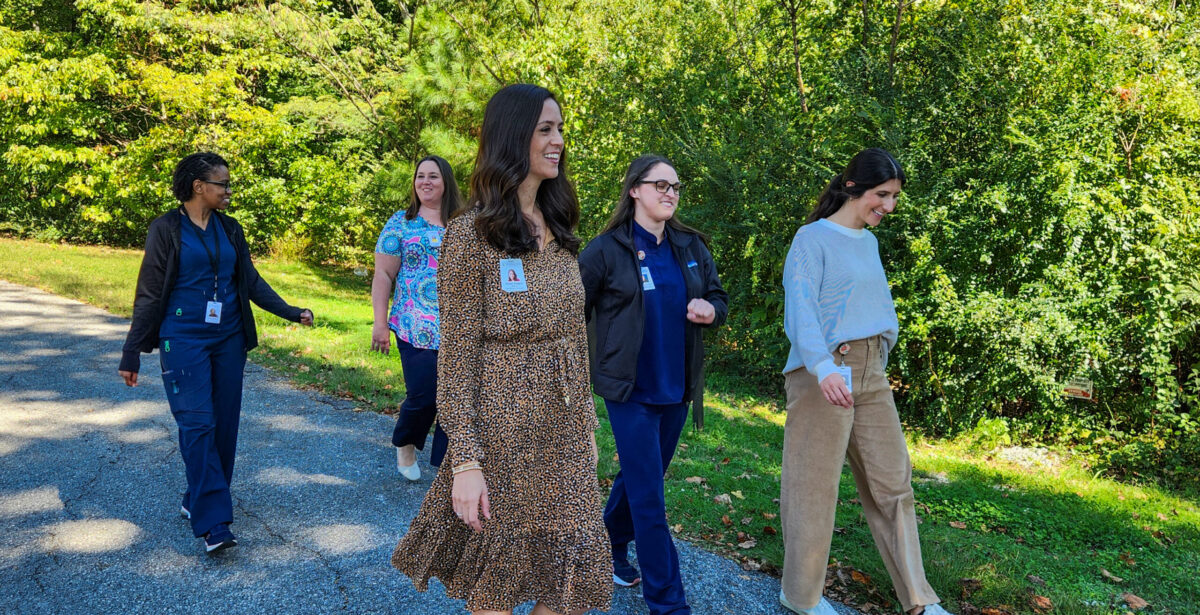Reviewed by: Callie Morrison
Find out why Princeton Women’s is a wonderful place to work
Reading time: 5 minutes
Sponsored

Having a baby is such a pivotal moment in any woman’s life—being surrounded by people who bring the right combination of warmth, knowledge and skill makes all the difference. We’d heard good things about welcoming a little one to the world at Princeton Baptist and wanted to find out more.

So, we spoke to three nurses with almost three decades’ combined experience at Princeton:
- Karlie Westbrook is an RN in the NICU.
- Amber Pearson is the day shift Charge Nurse for Labor and Delivery.
- Tamara Bunn is the Neonatal Resource Nurse.
Six clear themes emerged about why they love working at Princeton and what they feel makes the experience fulfilling for everyone—staff, moms and babies.
1. Supporting moms to have the experience they desire

A large percentage of Princeton’s patients come for low-intervention birth, so their nurses are prepared to help moms follow their birth plans where possible.
During labor, they focus on what the mom wants and provide what they can to make her experience what she wants it to be. This includes pools for labor as an alternative to medical interventions for pain. They also allow patients to labor in the showers when appropriate.
Amber appreciates that their unit is small enough to provide patient-centered care and that they’re equipped to handle high-risk conditions and situations.
“All of our unit is staffed with nurses who are truly passionate about women’s health. A lot of us went to nursing school to be involved in women’s care. We all really enjoy what we do. And I think it’s evident to our patients how much we care about this area of nursing.”
Does this sound like somewhere you’d like to work? Princeton Baptist is hiring.
2. Seeing miracle babies survive + thrive at Princeton Women’s
Karlie Westbrook recounted an experience she had with the first micro-preemie (less than 1000 grams) she encountered:
“I had just come off of orientation and was taking care of her on my own. Although she’d been fairly stable, I came in one morning to learn she’d had a massive pulmonary hemorrhage.
I didn’t understand a lot at the time, but I did know that was not going to be a good thing. It was quite the day, getting her back to a stable baseline.
A little while ago, we were looking at some pictures on Facebook. One of the nurses is friends with her mom, and it was incredible to see how far she’s come—she’s playing sports and looks totally healthy now.”
3. Teaching moms to care for their babies

Karlie loves helping moms learn how to care for their babies, for example, changing the first diaper on their preemie who has cords and IVs or holding their preemie for the first time. She explained that sometimes it’s a week or more before the mom can hold her baby, and it’s always a really special moment.
4. Supporting moms with breastfeeding at Princeton Women’s

Tamara explained how they give moms undisturbed bonding time with their little ones where possible, then teach various techniques and positions to facilitate a successful breastfeeding experience.
For this, according to Amber, they all receive 20 hours of online breastfeeding education and spend hours with the lactation consultants so they have a strong knowledge base for helping their patients.
5. Being part of a Baby-Friendly Hospital

In 2018, Princeton Baptist received the prestigious Baby-Friendly Designation from Baby-Friendly USA. The Baby-Friendly recognition acknowledges Princeton Baptist’s commitment to providing an optimal level of care for breastfeeding mothers and their babies.
Tamara explained that this translates into a focus on skin-to-skin contact, bonding and breastfeeding and the benefits for both moms and babies.
6. Being part of a close-knit family-like atmosphere

All three nurses talked about how working in such a small unit, they are able to go the extra mile to make the experience more personal for each family.
In fact, Karlie had both her babies at Princeton:
“It was a great experience for both of us—it felt like I was delivering with family.”
Tamara elaborated:
“We may not be the largest hospital, but I feel like you get a more personalized experience in a smaller hospital. You recognize your nurses. You’re comfortable with them, what’s going on, and how your experience is.
We are all passionate about women’s health and look forward to helping to deliver everybody’s sweet babies.”
Want to support moms and babies? Princeton Baptist is hiring.
Sponsored by:



 11000 views
11000 views